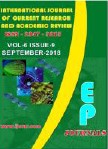Abstract Volume:6 Issue-9 Year-2018 Original Research Articles
 |
Online ISSN : 2347 - 3215 Issues : 12 per year Publisher : Excellent Publishers Email : editorijcret@gmail.com |
Aware of the interaction between gross domestic savings and economic growth is critically importance for policy option. However, the wide range of controversies surrounding the direction of causality between savings and economic growth motivated this study. Therefore, the objective of this study is intended to investigate empirically the Nexus between gross domestic savings and economic growth in Ethiopia using annual time series data spanning through a period of 42 years (1976 to 2017) obtained from MoFEC and annual reports of NBE. The study employed recently developed methods of autoregressive distributed lag (ARDL) approach to co-integration test and the augmented Granger causality test approach developed by Toda and Yamamoto (1995) so as to achieve this objective. After performing robustness checks, ARDL bounds to co integration test can be concluded that there is significant evidence that gross domestic savings and economic growth are co-integrated, and therefore hold a long run relationship exists between them. Error correction model also identified the presence of short run relationship. The Toda and Yamamoto version of granger causality test reveals that causality runs from economic growth to gross domestic savings, implying that economic growth precedes and granger causes saving. Thus, the study rejects the Solow’s hypothesis that saving precedes economic growth, and accepts the Keynesian theory that economic growth leads to higher saving. As a result, the study recommends that government and policy makers should focus on income policies that would accelerate economic growth so as to increase saving.
How to cite this article:
Zelalem Adugnaw Welela. 2018. Analysis of the Nexus between Gross Domestic Savings and Economic Growth in Ethiopia: Evidence fromToda-Yamamoto Causality Approach.Int.J.Curr.Res.Aca.Rev. 6(9): 34-49doi: https://doi.org/10.20546/ijcrar.2018.609.005



Quick Navigation
- Print Article
- Full Text PDF
- How to Cite this Article
- on Google
- on Google Scholor
- Citation Alert By Google Scholar
